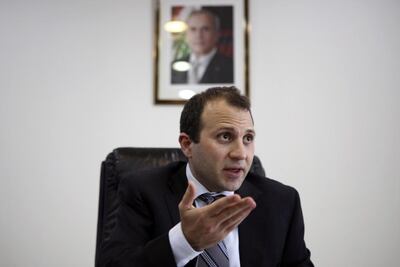Lebanon’s prime minister-designate Najib Mikati began discussions on forming a new Cabinet on Tuesday in the latest bid to break the political deadlock in the country.
Mr Mikati, a billionaire businessmen and two-time former prime minister, said he hoped a Cabinet would be formed soon.
He held talks with parliamentary blocs before meeting President Michel Aoun.
“I informed the president in detail on the non-binding parliamentary consultations, and stressed the importance of forming a government as soon as possible,” Mr Mikati said.
“Opinions are aligned to a very large extent and we will hold successive meetings in coming days, and, God willing, we will have a government soon."
The formation of a Cabinet has been a long-held demand among the international community, led by the US and France. Both say financial support is contingent on the introduction of reforms to fight against corruption and revive the economy.
On Monday, the EU and France urged Lebanon’s political leaders to form a government without delay.
“It is now of crucial importance that a credible and accountable government is formed in Lebanon without delay, one that is able to address the severe economic and social crises the country is facing,” the EU said in a statement.
“We call on the Lebanese political leaders to co-operate and allow for the swift formation of a credible and capable government, in the interest of the people of Lebanon,” it said.
Mr Mikati had said that he was confident he could form a government to enact the French-sponsored reform initiative but that success hinged on the “co-operation of all Lebanese”.
His designation to succeed Saad Hariri, who stepped down as prime minister-designate after 10 months of disputes with Mr Aoun, was backed by major parties across the political spectrum.

But his nomination lacked the support of any major Christian group, including Gebran Bassil, Mr Aoun’s son-in-law and leader of the largest parliamentary bloc.
Mr Bassil informed Mr Mikati on Tuesday that the Free Patriotic Movement, a party founded by Mr Aoun, would not take part in his government.
But Mr Bassil did not rule out granting Mr Mikati’s government a vote of confidence in Parliament were a Cabinet to be formed in agreement with the president.
That would depend on the “Cabinet’s line-up and agenda", Mr Bassil said.
An ally of the Iran-backed Hezbollah, Mr Bassil had sparred for months with Mr Hariri, accusing him of seeking to dictate the Cabinet line-up in violation of the constitution, which requires both the president and prime minister to sign off on the government.
Mr Hariri stepped down after talks with the president hit a dead end, and he accused Mr Aoun of blocking the formation of a government of non-partisan experts in which Mr Bassil would lack any veto power.
Mohammad Raad, head of Hezbollah's parliamentary bloc and an ally of Mr Bassil, held talks with Mr Mikati on Tuesday.
Mr Raad said he emphasised the importance of forming a government that brings together experts with “experience in public life".
The political tug of war has left Lebanon without a functioning government since the massive Beirut blast last August that deepened Lebanon’s economic and financial woes.
The blast killed more than 200 people and destroyed large parts of the capital.
More than half the country's population lives below the poverty line, while shortages in fuel are disrupting electricity and water supplies and causing frequent cuts to the internet.


